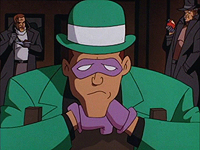 |
The Riddler: Clueless
by Scott Summers
 We’ve all seen it before. Usually it’s booze, drugs or womanizing; it can come in the form of ducking out on dates, investing irresponsibly, or pigging out at Krispy Kreme. Plenty of otherwise rational people just can’t stop themselves from doing the single thing that hurts them the worst—just like Edward Nygma. With him, it’s a pitiable propensity to advertise the crimes he’ll commit in advance. And that’s the key to diagnosing the Riddler. Why in the world, if you were consistently pursued, smacked down and jailed by Batman, would you continue to alert him to your future plans? If it means doing time, why announce the crime?
We’ve all seen it before. Usually it’s booze, drugs or womanizing; it can come in the form of ducking out on dates, investing irresponsibly, or pigging out at Krispy Kreme. Plenty of otherwise rational people just can’t stop themselves from doing the single thing that hurts them the worst—just like Edward Nygma. With him, it’s a pitiable propensity to advertise the crimes he’ll commit in advance. And that’s the key to diagnosing the Riddler. Why in the world, if you were consistently pursued, smacked down and jailed by Batman, would you continue to alert him to your future plans? If it means doing time, why announce the crime?
Bats all but makes the diagnosis himself after falling afoul of Riddler’s sophomoric games one too many times: “You can’t help yourself!” he shouts. He’s right; Nygma is compulsive. He tries again and again to prove himself by stumping his adversary. He’s chosen crime as his métier, and he can’t stop until he finally zings Batman good.
Thing is, Nygma’s crimes aren’t much to write your old buddies in Stonegate about. He kidnaps his old boss, then locks up Commissioner Gordon. No complicated heists, no elaborate double-crosses, not even one attempt at knocking over the Gotham Gold Reserve—and this from a self-professed criminal genius. So, here’s a riddle for you, Eddie: cui bono? Who really profits from this rinky-dink criminal repertoire?
It sure isn’t the Riddler himself. For such a disgruntled ex-employee, he doesn’t work very hard to line his pockets after getting the axe. He throws over a newly lucrative, lawful gig as a notorious toy designer, ditching the chance to score with a couple of Gotham hotties along the way. Sure, he puts the bash-and-pry on a few odd jewelry stores, but only because their map coordinates fit into a riddle—at that point, he doesn’t need the money.
And what about his mean streak? If he really wanted to kill Mockridge, why didn’t he just go ahead and do it, instead of turning it into a puzzle? One might even say each of his crimes is its own reward—like intellectual works of art, with Batman as their critic. Naturally, you have to take pains not to kill your audience, and to that end Nygma hands out broad warnings in the form of clues. Take “Losers ahead:” Nygma would rather see his adversary figure it out than get a buzz saw to the neck.
So Nygma compulsively commits unprofitable crimes and fixates on Batman’s detective prowess. Doesn’t that add up to obsessive-compulsive disorder? Not quite. OCD sufferers are driven by painful anxiety to repeat their actions, like checking the stove so many times they can’t leave the house. By contrast, Nygma succeeds at his penny-ante goals—he robs the stores, strews the hints, lures the Bat. No, Nygma gets what he wants, even though it isn’t much. Which makes him just another case of familiar Gotham narcissism, and this time it’s more of a systemic personality problem than an encapsulated disorder. He hurts himself much more than he hurts others, right up to the point where an attempt to kill Batman really tears him up inside. Worst of all, the poor fellow can't bear to be called “crazy,” hinting that he knows there’s something wrong with him but can’t figure out what it is.
Being trapped inside a pattern that he can’t identify, can’t stop, and can’t escape—now that’s a riddle.
DSM-IV-TR Diagnosis: 301.9 Personality Disorder NOS, with Masochistic Features; 301.81 Narcissistic Personality Disorder
Back to Paige Monroe |
Forward to Arnold Wesker |